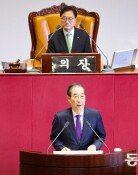Han folks, Joseon folks, and Kim Il Sung folks
Han folks, Joseon folks, and Kim Il Sung folks
Posted April. 26, 2013 06:48,
Pro-North Korea website Uriminzokkiri (meaning between our folks) got famous after being hacked by a group of left-wing hackers called Anonymous. Even a namesake parody website was introduced on CNN. Pyongyang has always talked about a project for its folks and recently demanded its nuclear weapons be respected as a common asset for its folks. The misunderstanding of our folks is as politically dangerous as being confused between the peoples democracy praising the madness of a crowd and free democracy.
Since the foundation of North Korea in 1948, the concept of Joseon folks has been imprinted to North Korean residents. They believe that the Democratic Peoples Republic of Korea is the successor of the first kingdom of Dangun Joseon on the Korean Peninsula, which was followed by the Joseon Dynasty founded by Lee Seong-gye and the Joseon under the Japanese colonial rule. For them, Han (Korean) folks are only a branch of Joseon folks. They refer to themselves the Buk (North) but never call themselves Bukhan (North Korea).
Meanwhile, our folks means Han folks in the Republic of Korea. When the Constitution says to solidify the unity of the folks, the folks mean Han folks. Unlike North Korea, South Korea replaced Joseon folks with Han folks when Prime Minister Lee Beom-seok made a public announcement in January 1950. He said, The official name of our country is the Republic of Korea but Daehan or Hankook can be used as abbreviations. However, Joseon cannot be used to discern ourselves from the North Korean regime. Even Lee Beom-seok, who was the hero of the Cheongsanri Battle, created a group of his young followers and named it Joseon Folks Youth Group in 1946. The flag of athletes sent to the London Olympics in 1948 used the name Joseon Olympic delegates.
The competitive relationship between Han folks and Joseon folks traces back to the foundation of the interim government of the Republic of Korea in 1919 and even to the foundation of the Korean Empire in 1897. After Emperor Gwangmu (also known as King Gojong) set up the Korean Empire, which entails the meaning of succeeding the ancient three Korean Hans (Mahan, Jinhan, Byeonhan), Daehan and Hankook contained the meaning of international independence, breaking with the imperial order. After the term Minzok (folks), which is a translation of the western concept of a nation was combined, the new concept Han folks was further spread.
The Japanese colonial rule degenerated Hankook to Joseon following its forceful integration. It implied that Korea should remain as Joseon just as it existed as Joseon under the influence of the Chinese Empire. Under the colonial rule, the concept of Joseon folks was possible, but not Han folks. An Jung-geun, a patriotic assassin, called himself a great Han person but many called themselves Joseon people.
The North Korean regime, which walked the autistic path by misusing the peoples sentiment behind the name of Joseon even after Koreas independence in 1945 from Japan based on the Joseon folks first policy, suddenly began to distribute the concept Kim Il Sung folks after the death of its founder Kim Il Sung in 1994. It even named its alphabet Kim Il Sung folks language" in 1997. It meant that Kim Il Sung folks are the new and modern folks transformed from anachronistic Joseon folks. Such perception starts from the ignorance that Joseon folks have changed into Han folks around the foundation of the Korean Empire in 1897. North Koreas Joseon history did not describe the independence of the Korean Empire.
While Pyongyang attracted overseas Korean expats and South Korean people using the term between our folks, some in South Korea rejected the concept of folks at all. The indiscriminate inflow of the discussion on western post-nationalism affected the South significantly. It is dangerous, however, to ignore the concept of folks amid China that emphasizes its 1.3-billon folks and Japan that claims that it has the only people with one civilization, one ethnicity, and one language. If done nothing, South Korean people can be absorbed to its neighbors naturally or give up its identity to Joseon folks or Kim Il Sung folks.
Han folks have been a Hangeul (Korean alphabet) community that succeeded a humanitarian one that links from Gojoseon to Joseon Dynasty, and developed the Korean Empire, the interim government of the Republic of Korea, and the Republic of Korea. The popularity of the Korean culture, which is widely popular in China and Japan which prefer using the Joseon peninsula to Han (Korean) peninsula, Joseon folks to Han folks, was made possible by the repressed Joseon folks progressing towards free Han folks. Seoul should not stay complacent about Pyongyangs political strategy, which tries to further regress Joseon folks to Kim Jong Il folks. It should try to share the progressed history from "Joseon folks" to "Han folks" and make various efforts to incorporate North Korean residents in such historical trends.







